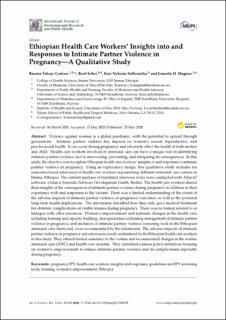| dc.description.abstract | Violence against women is a global pandemic, with the potential to spread through generations. Intimate partner violence has impacts on women’s sexual, reproductive, and psycho-social health. It can occur during pregnancy and adversely affect the health of both mother and child. Health care workers involved in antenatal care can have a unique role in identifying intimate partner violence and in intervening, preventing, and mitigating its consequences. In this study, the objective was to explore Ethiopian health care workers’ insights of and responses to intimate partner violence in pregnancy. Using an exploratory design, this qualitative study includes ten semi-structured interviews of health care workers representing different antenatal care centers in Jimma, Ethiopia. The content analyses of translated interview notes were conducted with Atlas.ti7 software, (Atlas.ti Scientific Software Development Gmbh, Berlin). The health care workers shared their insights of the consequences of intimate partner violence during pregnancy in addition to their experience with and responses to the victims. There was a limited understanding of the extent of the adverse impacts of intimate partner violence on pregnancy outcomes, as well as the potential long-term health implications. The informants described how they only gave medical treatment for obstetric complications or visible trauma during pregnancy. There was no formal referral to or linkages with other resources. Women’s empowerment and systemic changes in the health care, including training and capacity building, clear guidelines addressing management of intimate partner violence in pregnancy, and inclusion of intimate partner violence screening tools in the Ethiopian antenatal care chart/card, were recommended by the informants. The adverse impacts of intimate partner violence on pregnancy outcomes were poorly understood by the Ethiopian health care workers in this study. They offered limited assistance to the victims and recommended changes in the routine antenatal care (ANC) and health care systems. They identified various policy initiatives focusing on women’s empowerment to reduce intimate partner violence and its complications especially during pregnancy. | en_US |

